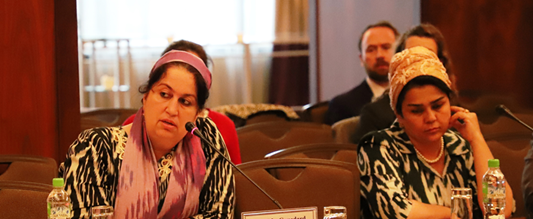The OSCE Programme Office in Dushanbe held the fourth coordination meeting dedicated to the implementation of Tajikistan’s 2020 National Strategy and Action Plan on Prevention of Violent Extremism in Dushanbe on 29 March 2019. It was organized together with Tajikistan’s Prosecutor-General’s Office.
According to the OSCE Programme Office, the meeting brought together both national and international high-level stakeholders to discuss the implementation of the National Action Plan on countering violent extremism (CVE). The participants identified further support areas for civil society and government institutions, in line with international human rights standards and best practices.
As part of the implementation efforts, the findings of OSCE’s professional development courses for public councils on police reform and CVE in the framework of community policing efforts were also presented.
“The OSCE recognizes that in the contemporary security environment the scale and complexity of terrorist threats is ever-changing. Therefore, the Organization promotes a cooperative and coordinative approach at all levels and in all forms,” emphasized Fejzo Numanaj, Acting Head of the OSCE Programme Office in Dushanbe.
Manouchehr Mahmoudzoda, Head of the International Cooperation Department of the Prosecutor-General’s Office, equally underlined that the cooperation between government, civil society, and international actors in this field is crucial.
“Our understanding of the issue is based on the tenets that the drivers of violent extremism and terrorism are context-specific, and require a multi-stakeholder approach to effectively counter this phenomenon,” stated Ambassador of the United States of America to Tajikistan John Marc Pommersheim.
Navrouz Odinayev, a civil society representative and member of Public Council on Police Reform said: “It is very important to have a coordination mechanism between civil society and government actors on the issues related to preventing and countering terrorism. Imposing restrictive measures, be it in cyberspace or elsewhere, will exacerbate the terrorist radicalization of youth.”
The meeting participants further shared their ideas on implementation modalities of the Strategy and agreed to co-ordinate their efforts on a bi-monthly basis.




